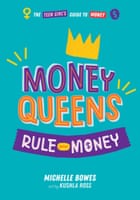
As any parent of teens will know, talking to them isn’t easy at the best of times. And when those conversations are about a topic as potentially complex as money, scaling Mt Everest might feel like an easier proposition.
But when it comes to arming your teen with some basic money smarts before they’re hit with a barrage of adult financial decisions, the buck stops with you. Financial literacy isn’t explicitly taught under the national curriculum, so it’s not a box you can rely on school to tick.
The OECD’s Programme for International Student Assessment suggested that the financial literacy of Australian teens fell by 15 points between 2012 and 2018. And girls, in particular, need our help – research commissioned by the Financial Basics Foundation in March of 2022 found that teenage girls are less confident than boys when it comes to financial knowledge.
Given that the gender pay gap stands at 13.8%, the gender retirement gap stands at 23.4% and ABS data indicate that women are more than twice as likely as men to be victims of financial abuse, preparing your teenage daughter for the world of money is essential.
Timing is everything
The current state of the Australian economy – with the cost of almost everything increasing – presents a great opportunity for money conversations. With $10 lettuces trending, petrol pushing $2.50 a litre and stable electricity supplies threatened due to escalating prices, it’s possible that money has never been more topical in your teen’s short lifetime so far.
But it’s also a potentially fraught conversation. Our teenage girls are facing a mental health crisis –the Australian Bureau of Statistics’ latest National Health Survey found that 32.7% of girls aged 15 to 24 suffer from a mental health condition. So how do you talk to teenage girls about money, without triggering despair about facing a world of rising debt, rising interest rates, rising prices and unaffordable housing?
When it comes to discussing money with teens, try the TALKS acronym: Tackle your own money taboos; Acknowledge your shortcomings; Lift examples from real life; Keep the conversation going and Stay positive.
Tackle your own money taboos
If you find it hard to talk to about money, it’s not entirely your fault. For generations, western culture has taught us that discussing money isn’t polite.
But that’s not a stigma you want to pass on to your children, as talking about money openly is an important way of building knowledge and developing understanding. So, no matter how uncomfortable you might find it, sacrifice your civility and make a start.
Acknowledge your own shortcomings
Another factor holding many parents back is a lack of confidence in their own financial knowledge. If this sounds like you, the good news is that we’re not talking about teaching the pros and cons of investing in cryptocurrency or the machinations of margin lending. All they need to learn, at least initially, are some basic lessons around the value of money and what things cost, along with budgeting, saving, credit and debt.
If you’re not exactly expert in these things yourself, grasp the opportunity to improve your own skills and learn together. This is a win-win; there is little that makes you seem more human and relatable to your teenagers than admitting that you don’t know everything, after all.
Lift examples from real life
The Financial Basics Foundation research also found that when it comes to explaining financial concepts, teens learn best when relevant, real-life scenarios are used. Try to bring money to life by using scenarios they may encounter or tell them stories about your own personal experiences with money (the good, the bad and the ugly).
Involving them in family financial management, such as recruiting their help to research a family holiday within a set budget or showing them how you manage the payment of household bills can also be a powerful way to bring money concepts to life.
Keep the conversation going
Money isn’t a subject you can talk to your teens about once and tick off your to-do list. Things evolve in the world of money (case in point – ten years ago no one had even heard of buy now pay later) and what your children need to know will change as they progress through their teens.
At 13 budgeting their pocket money to save up for something they want is a great lesson, while at 15 they might get their first job and the conversation will need to shift to understanding tax, how to open a bank account and how superannuation works. By 18 you’ll need to have discussed credit cards, buy now pay later, and, depending on their future plans, how the higher education loans program (Help) works.
Stay positive
Finally, don’t use scare tactics to try to show your teenagers why financial literacy is important, even in the face of the rising cost of living or the gender inequalities inherent in the financial system.
Instead, keep the emphasis on how they can tackle these issues rather than the issues themselves, like how to spend smartly at a time when costs are increasing or understanding what they’ll need to think about to avoid the gender pay gap. Forewarned is forearmed, but proactively prepared is better.
-
Michelle Bowes is the author of Money Queens, a personal finance guidebook for teenage girls, out now through Affirm Press.



